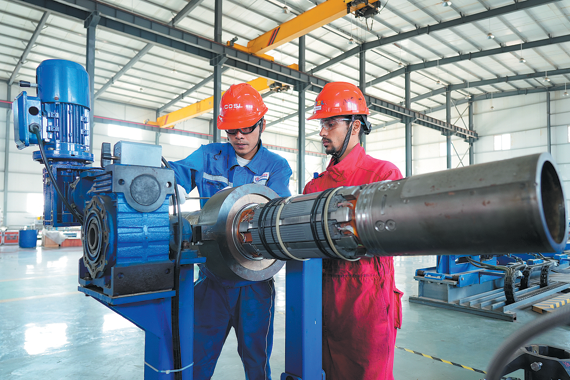Further deepening reform is key to advancing modernization


The third plenary sessions of the CPC Central Committee have always played a special role, deeply changing the course of the country. The third plenary session of the 14th CPC Central Committee in 1993 formulated the basic framework of the socialist market economic system and proposed the establishment of a modern enterprise system. The 18th CPC Central Committee in 2013 set the goal of comprehensively deepening reform. These plenums have been the platforms from which the government has launched seminal policies and decisions, such as the reform and opening-up policy in 1978.
The post-pandemic world is entering a period of intense change, in the face of new systemic challenges. Upgrading and reforming the economic system is central to the comprehensive deepening of reform. We can expect the CPC Central Committee to announce interesting new pivots and more granular reforms that align with the country's current development trajectory in key target sectors, to provide major initiatives that address the risks and obstacles in the path of China's long-term social and economic progress.
The third plenary session is also expected to focus on policies to promote new-type industrialization and point toward new development. There is conjecture about China's future development trend and policy direction and even a feeling that China's reform has come to a halt, which is certainly not the case.
Reform of State-owned enterprises and ways to promote the coordinated development of urban and rural areas are complex policy issues that need to be addressed.
China is following a balanced path toward enhanced economic, human, and institutional modernization. The plenum is expected to map out some new applicable initiatives. Despite pressures, the path to further reform and opening-up will continue.
Reform and opening-up refers to a variety of economic restructurings termed socialism with Chinese characteristics. As President Xi Jinping mentioned, "there are deeper reforms and further reforms", which are well-engineered and structured and have nothing to do with the Western-style development model, "those new reforms have to be well adapted and attuned to the situation to fully embrace the Thought on Socialism with Chinese Characteristics for a New Era". Reforms need constant and permanent upgrades, to add new features, and to fix problems. The CPC Central Committee has introduced a series of innovative ideas with new thoughts and new strategies to deepen reform of the economic system. This comprehensive deepening of reform is aimed at improving state systems and governance through reform with a focus on improving public management systems, which are essential for meeting the people's expectation for a better life, and ensuring that reform procedures are well coordinated, fully integrated, and truly effective. On the goals and aims for further reform, China will complete the building of a high-standard socialist market economy by 2035.
This third plenary session is developing priorities that could reshape China's economic future and it is an opportunity to enact major structural reforms. China's fixed asset model must yield at a faster pace to become a more consumption-centered, skill-intensive and services-driven growth model that is consistent with internal economic rebalancing and aggregate demand management.
China is trying to be less dependent on its real estate sector. The property sector was once a pillar of the country's economic growth, but now China has to boost the services industry and consumer stimulus to shore up demand and confidence of the private sector.
This third plenum conveys historical significance and is expected to highlight resource allocation. Key initiatives may include further refining property rights protection, streamlining market access regulations, and promoting fair competition by dropping monopolistic practices.
Meanwhile, it is also expected that the CPC Central Committee will look to adjust the tax structure and refine payment systems to better support regional development and economic equality.
Promoting high-level opening-up will help China better adapt to the new global competitive environment and counter the West's efforts to contain China through "de-globalization", "decoupling" or "de-risking" measures.
People-centric development is one of the principles driving Chinese development and modernization. A series of major policy reforms aimed at enhancing social equity, and improving the healthcare-social security systems and rural development programs are expected to be introduced, underscoring the Party's commitment to delivering social justice and maintaining harmony and ensuring the fruits of development are equitably distributed. This people-centric principle not only improves social stability but also gathers public support for reform. This is a major issue of national governance and developing a distinctively Chinese social security system is integral to Chinese modernization.
The future of China will be misjudged if we don't try to fully understand the CPC Central Committee's decisions on further comprehensive deepening of reforms and advancing Chinese-style modernization. China is working to achieve modernization for more than 1.4 billion people, more than the combined population of the world's developed countries. This will largely redesign and reshape the landscape of global modernization, unprecedented in human history.
A goal-driven approach will help keep the reform working on the right path with the immutable aim of putting the people above all else. The defining theme of high-quality and sustainable development is part of improving accessibility by promoting high-quality participation with systemic integration and key priorities. This is not only for China's good but also for the prosperity of the world. China's paramount role as a global growth engine, a pillar of economic globalization, and a defender of world peace and stability, will inject more certainty into the development of not only the country but also the entire world.
By converging interests, and sharing opportunities through opening-up and cooperation, China stays a strong advocate of openness at the global level, and will continue to function as a stable engine of global growth and a huge market with massive opportunities.
The author is executive vice president of the French Chamber of Commerce and Industry in China and doctoral candidate in sustainability and knowledge economy at Skema Business School.

































